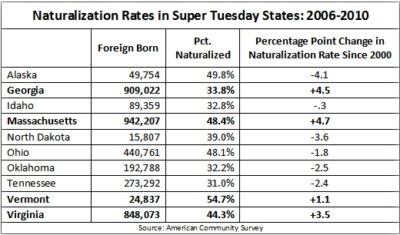Border Enforcement
Migration at the border is a multifaceted issue, challenging the U.S. to secure our borders while upholding the human rights of individuals seeking safety and better opportunities. Balancing national security with compassion and our legal obligations to asylum seekers presents intricate dilemmas, and we collaborate with policymakers to advance bipartisan, action-oriented solutions.
Beyond A Border Solution
- Asylum
- May 3, 2023
America needs durable solutions. These concrete measures can bring orderliness to our border and modernize our overwhelmed asylum system. Read…
Read More
Mother Jones Exposes Inner Workings of the Self-Deportation Movement
In its March/April issue, Mother Jones Magazine goes “inside the self-deportation movement,” exploring “164 state anti-immigration bills and the forces behind them.” The concept of “self deportation,” popularized by GOP presidential contender Mitt Romney, is central to the philosophy of “attrition through enforcement.” The basic idea is that, if you make life hard enough for unauthorized immigrants, they will pick up and leave of their own accord, which means the state will not have to hunt them down, detain them, and deport them. Read More

Mother Jones Exposes Inner Workings of the Self-Deportation Movement
In its March/April issue, Mother Jones Magazine goes “inside the self-deportation movement,” exploring “164 state anti-immigration bills and the forces behind them.” The concept of “self deportation,” popularized by GOP presidential contender Mitt Romney, is central to the philosophy of “attrition through enforcement.” The basic idea is that, if you make life hard enough for unauthorized immigrants, they will pick up and leave of their own accord, which means the state will not have to hunt them down, detain them, and deport them. Read More

Court Strikes Down Provision of Fremont’s Immigration Ordinance, Impact on Community Continues
BY DARCY TROMANHAUSER, PROGRAM DIRECTOR AT NEBRASKA APPLESEED. A federal court’s recent decision to strike down the core of Fremont’s immigration enforcement ordinance (Ordinance No. 5165)—which requires businesses to verify employees’ immigration status and renters to apply for an occupancy license—is no surprise. Across the country, every immigration ordinance with a rental component has been found unconstitutional—but not before creating great cost, division, and a sense of loss in the local community. Although Fremont’s immigration measure has not yet gone into effect, its passage is having a devastating impact on the community. Read More

Despite Alabama’s Cautionary Tale, Mississippi Moves Forward with Extreme “Papers, Please” Immigration Legislation
So much for Southern hospitality. Despite damning reports, bad press and mea culpas from politicians out of Alabama following passage of their extreme immigration law, HB 56, Mississippi lawmakers continued down the same destructive path this week. Mississippi’s “papers please” immigration bill, HB 488—which contains nearly all the same provisions as Alabama’s extreme immigration law, including those previously blocked by a Federal Appeals Court—passed out of two committees this week. In addition to the “papers, please” provision, Mississippi’s law also requires every public school to determine the immigration status of every enrolling student. The law also makes it illegal for any state or local governmental entity to engage in any “business transaction” with an undocumented immigrant—potentially denying basic medical care and access to utilities to families and children. The bill now goes back to the Mississippi House for debate. Read More

ICE Distorts Facts in Debate over Immigration Detainers
February was an important month in the debate over immigration “detainers,” the controversial tool used to strong-arm local jails into holding immigrants on the federal government’s behalf. In Connecticut, a class-action lawsuit was filed attacking detainers’ many legal vulnerabilities, and the Governor announced that state jails will not honor them in all cases. In Illinois, Cook County received another pointed letter from Immigration and Customs Enforcement (ICE) Director John Morton over a local ordinance enacted last year. While immigration detainers are a subject of legitimate public debate, the controversies demonstrate how ICE has resorted to making disingenuous legal claims in apparent hopes spreading the mistaken belief that immigration detainers must be honored. Read More

New Report Debunks Myth of Self-Deportation
Faced with harsh anti-immigrant laws passed by state or local governments, most unauthorized immigrants do not return to their home countries. That is the inescapable conclusion of a new report from the Center for American Progress (CAP), entitled Staying Put but Still in the Shadows, by Leah Muse-Orlinoff. The report finds that unauthorized immigrants react to anti-immigrant laws by moving to a different county or state, or by staying right where they are and isolating themselves even further from the larger society. In other words, GOP presidential contender Mitt Romney was wrong when he argued that a “self deportation” solution to the problem of unauthorized immigration might actually work. Read More

Courts, State Legislators Pull Back on Restrictive Immigration Legislation
Although several states were eager to introduce their own restrictive immigration bills following Arizona and Alabama’s harsh laws, some legislators and federal judges are now pulling back on these costly bills. A federal judge in Utah this week refused to issue a ruling on the state’s immigration law in anticipation of a Supreme Court ruling on Arizona’s law while a federal judge in Nebraska struck down part of a restrictive city ordinance, finding a housing provision to be “discriminatory.” Meanwhile, legislators in Kansas and Virginia also failed to move forward on a series of restrictive immigration bills this week, due in part, as one article suggests, to the “political blowback to similar measures that have been enacted in states such as Arizona, Alabama and Georgia.” Read More

Kris Kobach, a Romney Immigration Advisor, Puts Number on Self-Deportation Plan
A recent Salon.com article quotes long-time immigration restrictionist Kris Kobach putting a figure on his self-deportation policy for the first time. “If we had a true nationwide policy of self-deportation,” Kobach said, “I believe we would see our illegal alien population cut in half at a minimum very quickly.” Salon.com did the math, finding that “with an estimated 11 million undocumented residents in the country, Kobach is hoping to force 5.5 million people to leave the country by 2016.” Kobach insists, however, that he does not want “to do it at gunpoint.” Instead, he said undocumented residents “should go home on their own volition, under their own will, pick their own day, get their things in order and leave. That’s a more humane way.” Read More

Kris Kobach, a Romney Immigration Advisor, Puts Number on Self-Deportation Plan
A recent Salon.com article quotes long-time immigration restrictionist Kris Kobach putting a figure on his self-deportation policy for the first time. “If we had a true nationwide policy of self-deportation,” Kobach said, “I believe we would see our illegal alien population cut in half at a minimum very quickly.” Salon.com did the math, finding that “with an estimated 11 million undocumented residents in the country, Kobach is hoping to force 5.5 million people to leave the country by 2016.” Kobach insists, however, that he does not want “to do it at gunpoint.” Instead, he said undocumented residents “should go home on their own volition, under their own will, pick their own day, get their things in order and leave. That’s a more humane way.” Read More
Make a contribution
Make a direct impact on the lives of immigrants.

